Content
International Day of Happiness
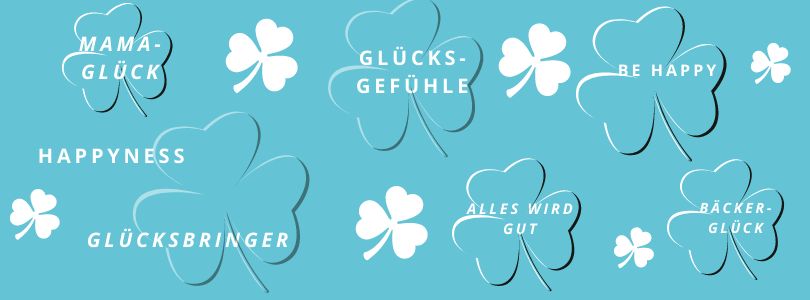
For more happiness and well-being
What is happiness and how can we find it? This is the question we ask ourselves on the occasion of the ![]() "International Day of Happiness", which was established by the United Nations as an international day in 2012 and which we celebrate every year on March 20th. The pursuit of happiness is laid down as a fundamental human goal even in two official UN resolutions. Since 2012, happiness has been measured and assessed worldwide by the United Nations Sustainable Development Solutions Network (
"International Day of Happiness", which was established by the United Nations as an international day in 2012 and which we celebrate every year on March 20th. The pursuit of happiness is laid down as a fundamental human goal even in two official UN resolutions. Since 2012, happiness has been measured and assessed worldwide by the United Nations Sustainable Development Solutions Network (![]() USNDSN). The UNSDSN publishes its findings in the
USNDSN). The UNSDSN publishes its findings in the ![]() World Happiness Report each year, according to which the happiest people in the world live in Finland; Germany ranks 17th.
World Happiness Report each year, according to which the happiest people in the world live in Finland; Germany ranks 17th.
The Nordic people always rank among the leaders in happiness. Why is it that they are so happy? According to the World Happiness Report, this is due to the following factors: reliable and extensive social benefits, low corruption and a well-functioning democracy and reliable state institutions.
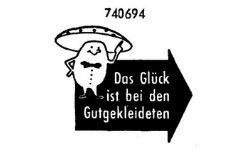
expired trade mark DE 740694
Furthermore, Nordic citizens experience a high sense of autonomy and freedom and high levels of social trust towards each other.
There is happiness in the trade mark register too
We too set off on our quest for happiness, namely in the DPMAregister. Enter "Glück" (happiness) as a search item to search for national trade marks and you get no fewer than 661 results. Where happiness lives: According to trade mark DE 303255900 "Ich bin zum Glück aus Osnabrück" (I am fortunate to be from Osnabrück), people who live in the Lower Saxon city can count themselves lucky. We may also be looking for "Schlummer-Glück", i.e. bed linen for a good sleep, see DE 302016017783 with the relevant graphic presentation. According to trade mark DE 740694, well-dressed people feel happiness ("Das Glück ist bei den Gutgekleideten").
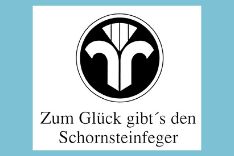
Collective mark DE 1152534
Also findable in the trade mark register are "Hans im Glück" (Hans in Luck) (several trade marks with different graphic presentations) and "Zum Glück gibt's den Schornsteinfeger" (It's lucky there's a chimney sweep) (see collective mark DE 1152534).
Can happiness be protected as a trade mark?
A list of 661 results in DPMAregister does not mean that all of these trade marks are protected. In some of their decisions, courts dealt with the question as to whether trade marks containing the word "Glück" (happiness) as an element can be protected. For example, the Federal Patent Court states with regard to "Mama-Glück" (mom’s happiness): "The word in respect of which a trade mark application has been filed consists of "Mama" (mom), the affectionate form of mother ..., and "Glück" (happiness), which means a "state of mental well-being" in the German language, "in which human beings accept their situation and their destiny and are emotionally aware of their acceptance: whether they believe the wishes apparently essential for them to have been fulfilled or whether they do not have essential wishes that go beyond the actual situation" (Brockhaus, encyclopaedia, 17th ed. 1969). ... the terms "Mama-Glück" or "Mamaglück" are colloquially used to describe a feeling of happiness experienced by mothers. ... This meaning of "Mama-Glück" provides consumers with general information about the purpose of these goods in a wording customary in advertising, namely to make a mother who is using them happy" (Federal Patent Court in Munich, decision of 23 March 2011 – 26 W (pat) 571/10 –, juris). As a consequence, the trade mark cannot be protected because it lacks distinctiveness and needs to be kept free for trade.
This applies similarly to "Bäckerglück" (happy baking) (Federal Patent Court in Munich, decision of 14 February 2017 – 25 W (pat) 515/17 –, juris), “GLÜCKSGEFÜHLE” (feelings of happiness) (Federal Patent Court in Munich, decision of 1 August 2012 – 26 W (pat) 508/12 –, juris), “Glücksbringer” (good luck charm) (Federal Patent Court in Munich, decision of 29 May 2013 – 27 W (pat) 517/12 –, juris) and “Geniessen macht glücklich”(enjoy and be happy) (Office for Harmonization in the Internal Market, decision of 5 October 2006 – R 763/2006-1 –, juris). Neither can English terms consumers might understand as a general promotion be registered as trade marks, e.g. “BE HAPPY” (e.g. Office for Harmonization in the Internal Market, decision of 17 October 2013 – R 31/2013-1 –, juris), “happy life” (EUIPO, decision of 3 May 2017 – R 1965/2016-4 –, juris) and "Happyness", a slightly modified version of the English original term (Federal Patent Court in Munich, decision of 8 March 2013 – 28 W (pat) 555/11 –, juris).
What about the plan to achieve happiness ("Plan vom Glück")?
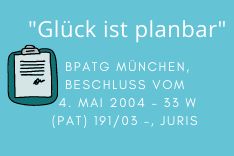
As early as 2004, the Federal Patent Court addressed the question as to whether happiness can be planned. In any case, the slogan "Glück ist planbar" (Happiness can be planned) cannot be protected as a trade mark for services rendered in the insurance and financial industries, as it lacks the required distinctiveness: “The sequence of words, created in a linguistically usual manner, draws the attention of the relevant public, i.e. the general public in the present case, to the services applied for and a related value proposition. Prospective customers ... are given the impression that using the services offered will have positive effects on future developments of their financial situation. The financial services applied for and especially the services relating to the insurance industry serve as a hedge against future risks and difficulties, e.g. in the field of third party liability and life policies.” (Federal Patent Court in Munich, decision of 4 May 2004 – 33 W (pat) 191/03 –, juris).
Will everything be fine?
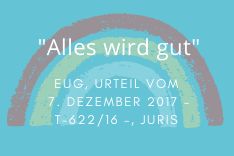
None of us can currently pretend to know how the world will develop. One thing at least is clear: Everyone will still be allowed to say that everything is going to be alright. The slogan cannot be registered as a trade mark because it lacks the distinctiveness required by trade mark law: "No interpretation or intellectual associations would be required of consumers in order for them to understand the phrase ... as a laudatory, reassuring expression that encourages the purchase or use of the goods … and highlights their attractiveness" (General Court, judgment of 7 December 2017 – T-622/16 –, juris).
Pictures: DPMA
Last updated: 20 May 2025

Not only protecting innovations
Social Media